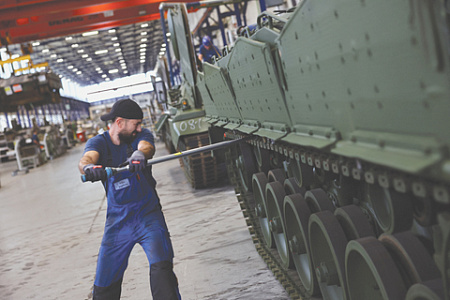
At a meeting of the EU Council on General Issues, a financial instrument was approved that makes it possible to dramatically increase investments in the defense industry in a relatively short period of time. The Europeans are striving to arm themselves on their own, not relying, as in former years, solely on the American defense “umbrella.” The decision taken on May 27 is one of the most important steps taken in this direction.
The tool is called “Security Action for Europe” (SAFE). This is a loan program worth 150 billion euros, formed from the funds of the European Union. With its help, as stated in the communique of the EU Council, “urgent and large-scale investments” in the production of weapons will be financed. Each of the EU countries can apply to SAFE and get a long-term loan for this purpose on lenient terms.
It is assumed that this should greatly accelerate the rearmament of the armies of European countries and at the same time not make solving this problem a heavy burden for their economies. This is especially important for poor states, by European standards, whose territories are considered by EU strategists as a possible theater of military operations in case it comes to a direct armed conflict with the Russian Federation. First of all, these are the Baltic countries – Lithuania, Latvia, Estonia with their tiny armies and fairly depleted arsenals, from which Ukraine is actively supplied. Therefore, SAFE provides for collective arms purchases involving at least two countries. Only in emergency cases, when weapons are needed very quickly and the issue of price no longer matters, the country has the right to act alone.
There is a provision in the SAFE program that will seriously affect the entire EU defense policy, even if relations with Russia somehow manage to normalize. Loans will be issued for purchases not only in the EU member states, but also in those that are members of the European Free Trade Association (EFTA) or the European Economic Area (CES). Simply put, weapons can be purchased in Norway, Switzerland and the UK. Not being EU members, they are closely integrated, thus, into the common defense system for the European Union.
The same can now be said, interestingly, about Ukraine. And according to SAFE, purchases can be made in it, although it is not included in either the CES or the EFTA. It can be said that, at least partially, the dream of many Ukrainians about European integration will come true – it will thus become an element of the EU’s common defense space. By the way, European Commissioner for Economic Affairs Valdis Dombrovskis spoke directly about this back in March. For the EU, however, it is probably important to take advantage of the developments of the Ukrainian military-industrial complex, which are currently being “tested” on the battlefield.
It is difficult to call SAFE an anti-American program, despite the fact that it does not provide for arms purchases in the United States, and Donald Trump constantly demands that Europeans buy more of everything American, including weapons. The EU is strengthening the defense capabilities of the Baltic countries, the most dependent on external military support for NATO members, thereby facilitating the solution of potential military tasks for the Pentagon. And the Baltic States are the region for which the Americans intend to stand up for sure. The point is not only the strategic importance of the region, but also the fact that Lithuania, Latvia and Estonia do not anger Trump, being “excellent students” in defense spending. The US president categorically insists that all NATO member states comply with the common requirement for alliance members to spend 2% of GDP on defense. A few days ago, Estonian Defense Minister Hanno Pevkur said that his country, as well as Latvia and Lithuania, are ready to even surpass this figure. Next year they will spend 5% of GDP. This is despite the fact that an increase in defense spending to such a level is not yet an official requirement of the alliance for its members. So far, there are only the relevant wishes of Trump and NATO Secretary General Mark Rutte.
The SAFE program was approved by the EU Council almost unanimously. Hungary abstained. Back in March, the country’s parliament, dominated by the Fidesz party, which supports the country’s long-time prime Minister Viktor Orban, adopted a resolution calling for exactly this to be done. The Hungarian authorities are going to rearm their army on their own, besides, they do not believe in impartiality in the distribution of EU money between countries. Budapest reminds Hungarians how EU funds allocated to overcome the consequences of the pandemic were frozen due to the fact that Orban, contrary to the EU’s insistence, did not bring Hungarian legislation into line with the requirements of observing the principles of democracy and the rule of law.
Apparently, in order to influence the obstinate Hungarian Prime Minister, the issue of Hungary’s possible deprivation of the right to vote in the governing structures of the European Union was included in the agenda of the EU Council. The seventh article of the EU treaty allows such an option for those countries whose policies are at odds with European values. We can say that this method of influence has worked. At least Hungary did not oppose, but only abstained.
